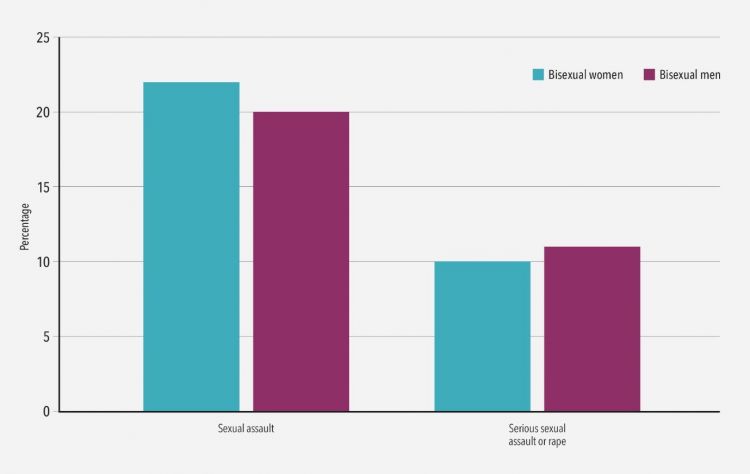
1 in 5 bisexual people have been sexually assaulted at work
For Bisexual Awareness week , 16- 22 September, I have a message for the bi trade unionists, and my bi friends and family and to all those bi people I don't know - you are loved, you are valid and you are valued.
And, importantly, the trade union movement has and will continue to stand up for your right to be visible part of the LGBT community and be free from discrimination.
Too often the bisexual experience is left out of important LGBT+ research, discussions and policy development. This clear bi-erasure continues to contribute to a poorly developed understanding of bi people’s experience at work and the particular types of discrimination they experience.
So this year, to mark Bisexual Visibility Day, we are highlighting bi people’s experiences of sexual harassment at work, drawing on the findings of our recent report . This will hopefully help workplaces tackle the issues that affect them at work and ensure their policies are inclusive of bi-workers.
Research shows workplaces which encourage authenticity are more likely to have higher retention rates, increased productivity, higher levels of commitment and this all adds up to a happier workplace.
The research also found;
- Nearly 1 in 3 (30%) reported they had experienced unwanted touching, for example placing hands on their lower back or knee
- More than 1 in 5 (21%) reported experiencing sexual assault, for example unwanted touching of the breasts, buttocks or genitals, or attempts to kiss them
- And 1 in 9 (11%) reported they had been seriously sexually assaulted or raped at work.
Bi women reported significantly higher levels of unwanted touching than bi men (38% vs 23%) but in other areas bi women and men reported similar rates of sexual harassment and assault:
- Around 1 in 5 reported they were sexually assaulted - for example unwanted touching of the breasts, buttocks or genitals, or attempts to kiss them – at work (22% of bi women and 20% of bi men)
- And around 1 in 10 said they were seriously sexually assaulted or raped at work (10% of bi women and 10% of bi men).

These are all both criminal offences and forms of sexual harassment at work. They are however not the only behaviours that qualify as workplace sexual harassment.
You will see from the table above there are a number of sexually harassing behaviours bisexual workers encounter at higher rates than the LGBT community in general. One of these behaviours was that bisexual workers reported hearing colleagues make comments of a sexual nature about a lesbian/gay woman, gay man, bisexual or trans colleague in front of them more frequently then the LGBT community in general. (54% bisexual workers to 47% for the LGBT community in general)
While all sexually harassing behaviours will have a negative impact on bisexual workers, this particular behaviour is likely to impact a bisexual worker’s decision to be open or not at work.
Bisexual workers were also more likely to report that sexual harassment had;
- caused them to leave their job with 1 in 4 (24%) saying it made them leave or want to leave their job, with 1 in 8 leaving as a result compared to 16% of LGBT workers in general
- say it had a detrimental impact on their overall health with 1 in 4 (24%) reporting this compared to 18% of LGBT worker in general
- a negative impact on their mental health with more than 1 in 5 (22%) reporting this compared to 16% of LGBT workers in general
One of the most striking findings was that over 4 in 10 bi workers were out to no one at work compared to just 3 out of 20 lesbians and gay men . This shows us that it is harder for bi workers to be truly authentic at work and that more needs to be done to enable them to bring their whole selves to work.
This is why it is vital employers, policy makers and trade unions (their reps and members) understand the impact of sexual harassment is different for different marginalised groups. It is only when this is truly understood that any intervention that is introduced will address the issue.
We all agree that sexual harassment has no place in the workplace. But every day, people across the UK are sexually harassed at work. And what you might not know is that currently, there is no legal duty on employers to take proactive action to prevent it from happening.
Hostile and harassing workplace environments make bi people feel unsafe to come out. To build bi visibility we need to create safe workplaces where bi people are able to be their full authentic selves. We can do this by getting the government to put in place a new duty to preventative to stop sexual harassment at work.
And you can help deliver this change!
Sign our petition calling on the government to introduce a new law, easily enforceable legal duty requiring employers to take all reasonable steps to protect workers from sexual harassment and victimisation and encourage other to do the same.
Stay Updated
Want to hear about our latest news and blogs?
Sign up now to get it straight to your inbox
